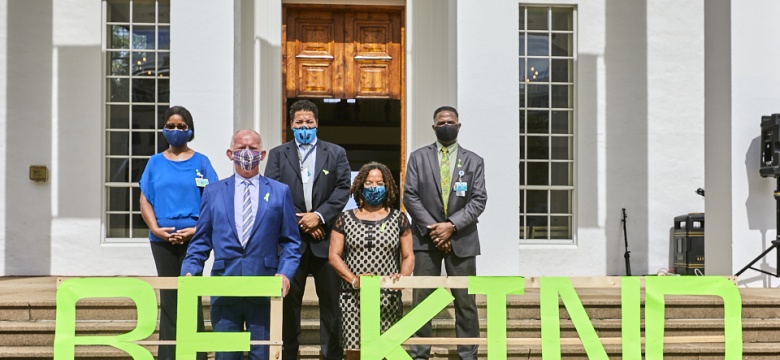Minister of Health Remarks from Mental Health Awareness Week Closing Ceremony

Good Afternoon,
Thank you for attending today’s closing ceremony for Mental Health Awareness Week.
Our theme for Mental Health Awareness Week was ‘Be Kind’. But our message today is that we want people to be kind well beyond this week. So although this is the official closing of Mental Health Awareness Week, it is also the official call to our Bermuda community to keep being kind after this week into the coming year and beyond.
The Dalai Lama has said, “Be kind whenever possible. It is always possible.”
Kindness is something we sometimes forget. It may seem challenging at times to fit in an act of kindness because we are stressed or having a bad day, or we just get busy.
But there are always opportunities to help family, friends and even strangers all around us: go for a walk with a family member, drop some groceries to a neighbour, open a door for someone who is struggling. Sometimes the smallest gestures have the greatest impact.
We can also be kinder in our interactions, even when we disagree with someone. This year, can we ask ourselves these questions: Where we can bring kindness into our lives? How do we speak to our children, or our aging parents? How can we post on social media with more kindness to each other, or send kinder emails? What about in schools, or in media stories and even in the House of Assembly?
Every day we can practice kindness, no matter who we are, what we do and what our life is like. It is important not just because it is the right thing to do. It also has a concrete impact on our mental wellbeing.
Sixty three percent of adults in an online survey agreed that when people were kind to them, it had a positive impact on their mental health. Studies have supported this, indicating increased feelings of happiness, wellbeing and life satisfaction. This is because kindness stimulates the production of serotonin, a feel-good chemical that calms you down, makes you happy and even heals your wounds.
You do not just have to be the recipient of kindness from others. When you are kind to another person, your brain’s pleasure and reward centres light up as if you were the recipient of the good deed. This phenomenon is called the ‘helpers high’.
Engaging in acts of kindness produces endorphins, the brain’s natural painkiller. Perpetually kind people have 23% less of the stress hormone, cortisol, and age more slowly than the average person.
People who receive social support and kindness from others, are also more likely to be kind to themselves. This is important too. Forty eight percent of UK adults in a survey agreed that being kind to themselves had a positive impact on their mental health.
Kindness even has a physical impact, lowering blood pressure by creating emotional warmth, which releases a ‘feel good’ hormone called oxytocin.
Finally, kindness strengthens our relationships with others and helps us feel more capable.
And from a healthcare perspective – there is no cost for us creating a more caring community which supports mental wellbeing and happiness. Kindness is not the solution to everything that ails us, but the evidence is that it helps. And everyone’s life is a bit better when we are kind.
So in closing Mental Health Awareness Week, I am going to challenge the Bermuda community: In what ways can you be kind each day? As we face economic challenges, fears about the pandemic, and our own personal situations, where can we bring kindness?
There is so much at the moment we cannot control – but being kind is something we can. Let’s make Bermuda kinder.
Thank you.